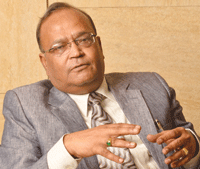Dilip Thakore interviewed Damodar Prasad Goyal, convenor of the National Foundation for the Prom-otion and Protection of Private Educ-ation in Mumbai and Bangalore. Excerpts:
 What are the factors or developments which have prompted you to promote the National Foundation for Promotion and Protection of Private Education (NFPPPE)?
What are the factors or developments which have prompted you to promote the National Foundation for Promotion and Protection of Private Education (NFPPPE)?
In spite of the qualitative and quantative growth of private, non-government educ-ation institutions as a result of public acceptance, these institutions, incl-uding private schools, have always been subject to government and public criticism, and rigid regulation. For over six decades non-government education institutions have tolerated a plethora of arbitrary and unfair regulations imposed upon them without protest as they were not united and orga-nised. Currently there are an estimated 200,000 private unaided schools in the country but their voices are unheard. The proposed NFPPPE will articulate their views and protect their interests.
What are the formal and informal aims and objectives of NFPPPE?
The prime objective of NFPPPE is to promote and protect private education institutions in the public interest. To attain this mission the foundation will work as a think tank which will deliberate and debate policies relating to private education from preschool to higher education, and inform the public about the valuable contrib-utions of private institutions to Indian education. We will present the viewpoints and perspectives of private educationists and educators in policy formulation forums and will educate the media, decision makers, and the public about the important role that private education institutions are playing — and will play — given their rightful place in Indian education.
We will also campaign for the right of for-profit education institutions to co-exist with not-for-profit, charitable and government education institutions because we believe that parents must have the right to choose the most appropriate type of education for their children.
Quite obviously promotion of NFPPPE is the outcome of dissatisfaction of private schools with the Supreme Court’s majority verdict in Society for Unaided Private Schools of Rajasthan vs. Union of India (2012). Do you intend to file a curative/review petition?
The majority judgement of the Supreme Court in this case which we lost, is not a sole reason for the promotion of NFPPPE. For a long time several educationists and educators have called for a united representative body of private unaided education institutions whose role in the national development effort has been continuously belittled.
Consequently they have suffered discrimination and have experienced considerable erosion of their administrative and academic autonomy. The foundation will challenge official, media and public criticism of private education institutions which have made many positive contributions to national development, out of all proportion to their number. Moreover we intend to legally challenge the assertion — reite-rated in the majority judgement in the Society for Unaided Private Schools of Rajasthan case — that education provided by unaided private schools has to be “charitable”.
Many eminent educationists believe that a common school system minus private schools is the best prescription for national development. What’s your comment?
I wonder what’s their definition of national development. To deny opportunity to excel to all because some have limited opportunity, is a policy prescription of frustrated people. Didn’t Mahatma Gandhi, Jawaharlal Nehru, Subhash Chandra Bose and numerous other national leaders and icons who received elite private education contribute to the freedom movement and national development? The common school system is an obsolete concept in the contemporary era of global competition and race for excellence.
India’s higher education institutions are even more strictly regulated than primary and secondary schools. Are you in favour of liberalising higher education as well?
The recent regime of regulations upon regulations is the handiwork of the incumbent Union HRD minister who with his background of legal practice seems to believe that more regulation is the answer for every problem in Indian education. I suspect he wants to be as well known for education reforms as Dr. Manmohan Singh is for economic reforms. But Dr. Manmohan Singh is a tried and tested professi-onal economist, whereas Mr. Sibal is neither an educationist nor — with due respect — is he tried and tested in this field.
Looking into the future, how optimistic are you that Indian education can become globally comparable and competitive?
Currently it is globally comparable and competitive. But other developing countries have realised they need to excel in this field. They are putting in hard work by way of intelligent education upgradation and reforms. In China over 300 million children are seriously learning English, and they are likely to nullify India’s traditional advantage of a huge pool of English-speaking youth. I fear that new reforms hurriedly introduced in school education such as CCE (comprehensive and continuous evaluation), and making the class X board exam optional and the class XII grading system will dull the comp-etitive spirit of India’s children and youth. I am of the firm opinion there’s no need to tamper with the school system and experiment with it just for the sake of it, or because people in authority have a contrary opinion.
There are many things to be done and undone in Indian education before we can intelligently make it competitive with the education systems of developed nations.